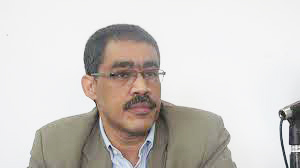
Interim President Adly Mansour issued a presidential decree on Wednesday with a new formation for the Supreme Press Council.
Mansour had ratified a bill drafted by the cabinet ordering the formation of an interim Supreme Press Council, answering the Press Syndicate’s demand.
The interim council consists of 15 members, reported state-run news agency MENA. They include: former Press Syndicate head Galal Aref, chief Editor of Al-Qahira newspaper Salah Eissa, dean of Cairo University’s faculty of mass communication Hassan Mekkawy, Press Syndicate head Diaa Rashwan, media professor at Cairo University Nagwa Kamel, criminal law professor at Cairo University Mahmoud Kebeish, Egyptian Social Democratic Party leading member and constitutional expert Mohamed Noor Farahat, head of Egypt’s Writers Union Mohamed Al-Selmawy, and journalists Kamal Al-Saeed Habib and Karima Kamal.
Hanan Fekry, Press Syndicate board member, stated that at least two-thirds of the council’s formation were nominated by the syndicate.
“The syndicate nominated its representatives as well as the public personalities,” Fekry said. “The presidency appointed the university professors.”
Fekry stated that the Syndicate originally wanted to cancel the Supreme Press Council and replace it with a National Press Council and a National Broadcast Council, to be mentioned in the constitution currently being drafted. However, Fekry said, seven different state laws refer to the Supreme Press Council, which makes it difficult to cancel the council altogether until the new constitution is issued.
“We thus agreed that this council formation, comprising of only 15 members instead of 50, would be an interim one,” Fekry said. The council’s mandate would elapse by the end of the Egypt’s current transitional period.
Fekry stated that the new formation is much better than the old one, issued by the now dissolved Shura Council in September 2012. The old council’s formation was highly criticised, with Abeer Saady, Press Syndicate board member, describing it as “flawed”.
“This is a professional council formation,” Fekry said. “The previous formation included members who had nothing to do with the press or with journalism.”
The new Supreme Press Council would take on the jurisdictions of the Shura Council, those regarding its control over the council itself. Saady earlier said the bill was suggested due to the dire need for a body that would manage the affairs of state-run press in the absence of the Shura Council.


